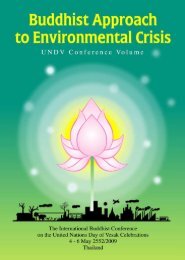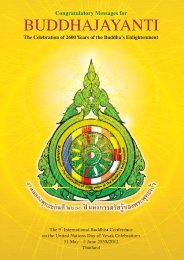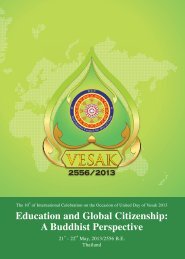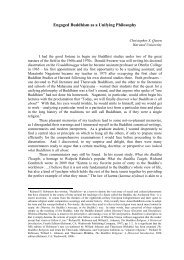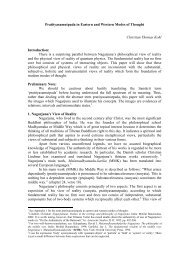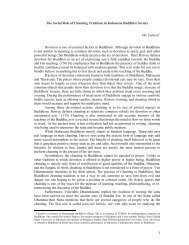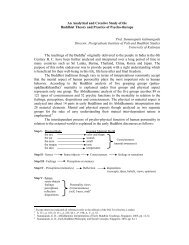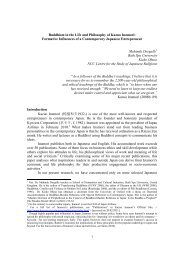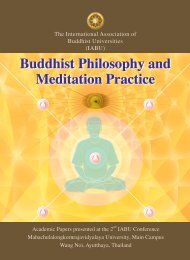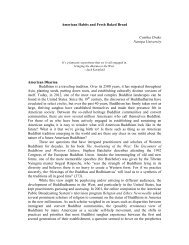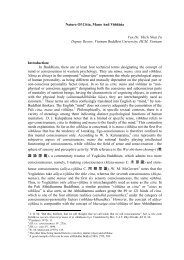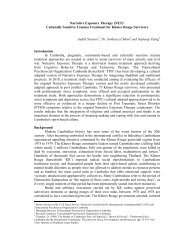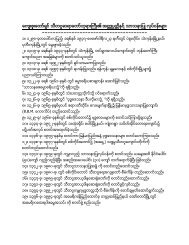- Page 1 and 2: Global Recovery: (1)
- Page 3 and 4: Preface Mahachulalongkornrajavidyal
- Page 5 and 6: Preface For Joint Hosting of the 7t
- Page 7 and 8: Table of Contents: Preface Table of
- Page 9 and 10: 29. Michael Franklin: Global Recove
- Page 11 and 12: 60. Sajal Barua: Vitakkasaṇṭhā
- Page 13 and 14: Global Recovery through Buddhist Ed
- Page 15: GLOBAL RECOVERY THROUGH BUDDHIST EC
- Page 18 and 19: Global Recovery - The Buddhist Pers
- Page 20 and 21: Global Recovery - The Buddhist Pers
- Page 22 and 23: Global Recovery - The Buddhist Pers
- Page 24 and 25: Global Recovery - The Buddhist Pers
- Page 26 and 27: Global Recovery - The Buddhist Pers
- Page 28 and 29: Global Recovery - The Buddhist Pers
- Page 30 and 31: Global Recovery - The Buddhist Pers
- Page 34 and 35: Global Recovery - The Buddhist Pers
- Page 36 and 37: Global Recovery - The Buddhist Pers
- Page 38 and 39: Global Recovery - The Buddhist Pers
- Page 40 and 41: Global Recovery - The Buddhist Pers
- Page 42 and 43: Global Recovery - The Buddhist Pers
- Page 44 and 45: Global Recovery - The Buddhist Pers
- Page 46 and 47: Global Recovery - The Buddhist Pers
- Page 48 and 49: Global Recovery - The Buddhist Pers
- Page 50 and 51: Global Recovery - The Buddhist Pers
- Page 52 and 53: Global Recovery - The Buddhist Pers
- Page 54 and 55: Global Recovery - The Buddhist Pers
- Page 56 and 57: Global Recovery - The Buddhist Pers
- Page 58 and 59: Global Recovery - The Buddhist Pers
- Page 60 and 61: Global Recovery - The Buddhist Pers
- Page 62 and 63: Global Recovery - The Buddhist Pers
- Page 64 and 65: Global Recovery - The Buddhist Pers
- Page 66 and 67: Global Recovery - The Buddhist Pers
- Page 68 and 69: Global Recovery - The Buddhist Pers
- Page 70 and 71: Global Recovery - The Buddhist Pers
- Page 72 and 73: Global Recovery - The Buddhist Pers
- Page 74 and 75: Global Recovery - The Buddhist Pers
- Page 76 and 77: Global Recovery - The Buddhist Pers
- Page 78 and 79: Global Recovery - The Buddhist Pers
- Page 80 and 81: Global Recovery - The Buddhist Pers
- Page 82 and 83:
Global Recovery - The Buddhist Pers
- Page 84 and 85:
Global Recovery - The Buddhist Pers
- Page 86 and 87:
Global Recovery - The Buddhist Pers
- Page 88 and 89:
Global Recovery - The Buddhist Pers
- Page 90 and 91:
Global Recovery - The Buddhist Pers
- Page 92 and 93:
Global Recovery - The Buddhist Pers
- Page 94 and 95:
Global Recovery - The Buddhist Pers
- Page 96 and 97:
Global Recovery - The Buddhist Pers
- Page 98 and 99:
Global Recovery - The Buddhist Pers
- Page 100 and 101:
Global Recovery - The Buddhist Pers
- Page 102 and 103:
Global Recovery - The Buddhist Pers
- Page 104 and 105:
Global Recovery - The Buddhist Pers
- Page 106 and 107:
Global Recovery - The Buddhist Pers
- Page 108 and 109:
Global Recovery - The Buddhist Pers
- Page 110 and 111:
Global Recovery - The Buddhist Pers
- Page 112 and 113:
Global Recovery - The Buddhist Pers
- Page 114 and 115:
Global Recovery - The Buddhist Pers
- Page 116 and 117:
Global Recovery - The Buddhist Pers
- Page 118 and 119:
Global Recovery - The Buddhist Pers
- Page 120 and 121:
Global Recovery - The Buddhist Pers
- Page 122 and 123:
Global Recovery - The Buddhist Pers
- Page 124 and 125:
Global Recovery - The Buddhist Pers
- Page 127 and 128:
Global Recovery : through Buddhist
- Page 129 and 130:
Global Recovery : through Buddhist
- Page 131 and 132:
Global Recovery : through Buddhist
- Page 133 and 134:
Global Recovery : through Buddhist
- Page 135 and 136:
Global Recovery : through Buddhist
- Page 137 and 138:
Global Recovery : through Buddhist
- Page 139 and 140:
Global Recovery : through Buddhist
- Page 141 and 142:
Global Recovery : through Buddhist
- Page 143 and 144:
Global Recovery : through Buddhist
- Page 145 and 146:
Global Recovery : through Buddhist
- Page 147 and 148:
Global Recovery : through Buddhist
- Page 149 and 150:
Global Recovery : through Buddhist
- Page 151 and 152:
Global Recovery : through Buddhist
- Page 153 and 154:
Global Recovery : through Buddhist
- Page 155 and 156:
Global Recovery : through Buddhist
- Page 157 and 158:
Global Recovery : through Buddhist
- Page 159 and 160:
Global Recovery : through Buddhist
- Page 161 and 162:
Global Recovery : through Buddhist
- Page 163 and 164:
Global Recovery : through Buddhist
- Page 165 and 166:
Global Recovery : through Buddhist
- Page 167 and 168:
Global Recovery : through Buddhist
- Page 169 and 170:
Global Recovery : through Buddhist
- Page 171 and 172:
Global Recovery : through Buddhist
- Page 173 and 174:
Global Recovery : through Buddhist
- Page 175 and 176:
Global Recovery : through Buddhist
- Page 177 and 178:
Global Recovery : through Buddhist
- Page 179 and 180:
Global Recovery : through Buddhist
- Page 181 and 182:
Global Recovery : through Buddhist
- Page 183 and 184:
Global Recovery : through Buddhist
- Page 185 and 186:
Global Recovery : through Buddhist
- Page 187 and 188:
Global Recovery : through Buddhist
- Page 189 and 190:
Global Recovery : through Buddhist
- Page 191 and 192:
Global Recovery : through Buddhist
- Page 193 and 194:
Global Recovery : through Buddhist
- Page 195 and 196:
Global Recovery : through Buddhist
- Page 197 and 198:
Global Recovery : through Buddhist
- Page 199 and 200:
Global Recovery : through Buddhist
- Page 201 and 202:
Global Recovery : through Buddhist
- Page 203 and 204:
Global Recovery : through Buddhist
- Page 205 and 206:
Global Recovery : through Buddhist
- Page 207 and 208:
Global Recovery : through Buddhist
- Page 209 and 210:
Global Recovery : through Buddhist
- Page 211 and 212:
Global Recovery : through Buddhist
- Page 213 and 214:
Global Recovery : through Buddhist
- Page 215 and 216:
Global Recovery : through Buddhist
- Page 217 and 218:
Global Recovery : through Buddhist
- Page 219 and 220:
Global Recovery : through Buddhist
- Page 221 and 222:
Global Recovery : through Buddhist
- Page 223 and 224:
Global Recovery : through Buddhist
- Page 225 and 226:
Global Recovery : through Buddhist
- Page 227 and 228:
Global Recovery : through Buddhist
- Page 229 and 230:
Global Recovery : through Buddhist
- Page 231 and 232:
Global Recovery : through Buddhist
- Page 233 and 234:
Global Recovery : through Buddhist
- Page 235 and 236:
Global Recovery : through Buddhist
- Page 237 and 238:
Global Recovery : through Buddhist
- Page 239 and 240:
Global Recovery : through Buddhist
- Page 241 and 242:
Global Recovery : through Buddhist
- Page 243 and 244:
Global Recovery : through Buddhist
- Page 245 and 246:
Global Recovery : through Buddhist
- Page 247 and 248:
Global Recovery : through Buddhist
- Page 249 and 250:
Global Recovery : through Buddhist
- Page 251 and 252:
Global Recovery : through Buddhist
- Page 253 and 254:
Global Recovery : through Buddhist
- Page 255 and 256:
Global Recovery : through Buddhist
- Page 257:
GLOBAL RECOVERY THROUGH ENGAGED BUD
- Page 260 and 261:
Global Recovery - The Buddhist Pers
- Page 262 and 263:
Global Recovery - The Buddhist Pers
- Page 264 and 265:
Global Recovery - The Buddhist Pers
- Page 266 and 267:
Global Recovery - The Buddhist Pers
- Page 268 and 269:
Global Recovery - The Buddhist Pers
- Page 270 and 271:
Global Recovery - The Buddhist Pers
- Page 272 and 273:
Global Recovery - The Buddhist Pers
- Page 274 and 275:
Global Recovery - The Buddhist Pers
- Page 276 and 277:
Global Recovery - The Buddhist Pers
- Page 278 and 279:
Global Recovery - The Buddhist Pers
- Page 280 and 281:
Global Recovery - The Buddhist Pers
- Page 282 and 283:
Global Recovery - The Buddhist Pers
- Page 284 and 285:
Global Recovery - The Buddhist Pers
- Page 286 and 287:
Global Recovery - The Buddhist Pers
- Page 288 and 289:
Global Recovery - The Buddhist Pers
- Page 290 and 291:
Global Recovery - The Buddhist Pers
- Page 292 and 293:
Global Recovery - The Buddhist Pers
- Page 294 and 295:
Global Recovery - The Buddhist Pers
- Page 296 and 297:
Global Recovery - The Buddhist Pers
- Page 298 and 299:
Global Recovery - The Buddhist Pers
- Page 300 and 301:
286 Global Recovery - The Buddhist
- Page 302 and 303:
Global Recovery - The Buddhist Pers
- Page 304 and 305:
Global Recovery - The Buddhist Pers
- Page 306 and 307:
Global Recovery - The Buddhist Pers
- Page 308 and 309:
Global Recovery - The Buddhist Pers
- Page 310 and 311:
Global Recovery - The Buddhist Pers
- Page 312 and 313:
Global Recovery - The Buddhist Pers
- Page 314 and 315:
Global Recovery - The Buddhist Pers
- Page 316 and 317:
Global Recovery - The Buddhist Pers
- Page 318 and 319:
Global Recovery - The Buddhist Pers
- Page 320 and 321:
Global Recovery - The Buddhist Pers
- Page 322 and 323:
Global Recovery - The Buddhist Pers
- Page 324 and 325:
Global Recovery - The Buddhist Pers
- Page 326 and 327:
Global Recovery - The Buddhist Pers
- Page 328 and 329:
Global Recovery - The Buddhist Pers
- Page 330 and 331:
Global Recovery - The Buddhist Pers
- Page 332 and 333:
Global Recovery - The Buddhist Pers
- Page 334 and 335:
Global Recovery - The Buddhist Pers
- Page 336 and 337:
Global Recovery - The Buddhist Pers
- Page 338 and 339:
Global Recovery - The Buddhist Pers
- Page 340 and 341:
Global Recovery - The Buddhist Pers
- Page 342 and 343:
Global Recovery - The Buddhist Pers
- Page 344 and 345:
Global Recovery - The Buddhist Pers
- Page 346 and 347:
Global Recovery - The Buddhist Pers
- Page 348 and 349:
Global Recovery - The Buddhist Pers
- Page 350 and 351:
Global Recovery - The Buddhist Pers
- Page 352 and 353:
Global Recovery - The Buddhist Pers
- Page 354 and 355:
Global Recovery - The Buddhist Pers
- Page 356 and 357:
Global Recovery - The Buddhist Pers
- Page 358 and 359:
Global Recovery - The Buddhist Pers
- Page 360 and 361:
Global Recovery - The Buddhist Pers
- Page 362 and 363:
Global Recovery - The Buddhist Pers
- Page 364 and 365:
Global Recovery - The Buddhist Pers
- Page 366 and 367:
Global Recovery - The Buddhist Pers
- Page 368 and 369:
Global Recovery - The Buddhist Pers
- Page 370 and 371:
Global Recovery - The Buddhist Pers
- Page 372 and 373:
Global Recovery - The Buddhist Pers
- Page 374 and 375:
Global Recovery - The Buddhist Pers
- Page 376 and 377:
Global Recovery - The Buddhist Pers
- Page 378 and 379:
Global Recovery - The Buddhist Pers
- Page 380 and 381:
Global Recovery - The Buddhist Pers
- Page 382 and 383:
Global Recovery - The Buddhist Pers
- Page 384 and 385:
Global Recovery - The Buddhist Pers
- Page 386 and 387:
Global Recovery - The Buddhist Pers
- Page 388 and 389:
Global Recovery - The Buddhist Pers
- Page 390 and 391:
Global Recovery - The Buddhist Pers
- Page 392 and 393:
Global Recovery - The Buddhist Pers
- Page 394 and 395:
Global Recovery - The Buddhist Pers
- Page 396 and 397:
Global Recovery - The Buddhist Pers
- Page 398 and 399:
Global Recovery - The Buddhist Pers
- Page 400 and 401:
Global Recovery - The Buddhist Pers
- Page 402 and 403:
Global Recovery - The Buddhist Pers
- Page 404 and 405:
Global Recovery - The Buddhist Pers
- Page 406 and 407:
Global Recovery - The Buddhist Pers
- Page 408 and 409:
Global Recovery - The Buddhist Pers
- Page 410 and 411:
Global Recovery - The Buddhist Pers
- Page 412 and 413:
Global Recovery - The Buddhist Pers
- Page 414 and 415:
Global Recovery - The Buddhist Pers
- Page 416 and 417:
Global Recovery - The Buddhist Pers
- Page 418 and 419:
Global Recovery - The Buddhist Pers
- Page 420 and 421:
Global Recovery - The Buddhist Pers
- Page 422 and 423:
Global Recovery - The Buddhist Pers
- Page 424 and 425:
Global Recovery - The Buddhist Pers
- Page 426 and 427:
Global Recovery - The Buddhist Pers
- Page 428 and 429:
Global Recovery - The Buddhist Pers
- Page 430 and 431:
Global Recovery - The Buddhist Pers
- Page 432 and 433:
Global Recovery - The Buddhist Pers
- Page 434 and 435:
Global Recovery - The Buddhist Pers
- Page 437:
GLOBAL RECOVERY THROUGH HARMONIOUS
- Page 440 and 441:
Global Recovery - The Buddhist Pers
- Page 442 and 443:
Global Recovery - The Buddhist Pers
- Page 444 and 445:
Global Recovery - The Buddhist Pers
- Page 446 and 447:
Global Recovery - The Buddhist Pers
- Page 448 and 449:
Global Recovery - The Buddhist Pers
- Page 450 and 451:
Global Recovery - The Buddhist Pers
- Page 452 and 453:
Global Recovery - The Buddhist Pers
- Page 454 and 455:
Global Recovery - The Buddhist Pers
- Page 456 and 457:
Global Recovery - The Buddhist Pers
- Page 458 and 459:
Global Recovery - The Buddhist Pers
- Page 460 and 461:
Global Recovery - The Buddhist Pers
- Page 462 and 463:
Global Recovery - The Buddhist Pers
- Page 464 and 465:
Global Recovery - The Buddhist Pers
- Page 466 and 467:
Global Recovery - The Buddhist Pers
- Page 468 and 469:
Global Recovery - The Buddhist Pers
- Page 470 and 471:
Global Recovery - The Buddhist Pers
- Page 472 and 473:
Global Recovery - The Buddhist Pers
- Page 474 and 475:
Global Recovery - The Buddhist Pers
- Page 476 and 477:
Global Recovery - The Buddhist Pers
- Page 478 and 479:
Global Recovery - The Buddhist Pers
- Page 480 and 481:
Global Recovery - The Buddhist Pers
- Page 482 and 483:
Global Recovery - The Buddhist Pers
- Page 484 and 485:
Global Recovery - The Buddhist Pers
- Page 486 and 487:
Global Recovery - The Buddhist Pers
- Page 488 and 489:
Global Recovery - The Buddhist Pers
- Page 490 and 491:
Global Recovery - The Buddhist Pers
- Page 492 and 493:
Global Recovery - The Buddhist Pers
- Page 494 and 495:
Global Recovery - The Buddhist Pers
- Page 496 and 497:
Global Recovery - The Buddhist Pers
- Page 498 and 499:
Global Recovery - The Buddhist Pers
- Page 500 and 501:
Global Recovery - The Buddhist Pers
- Page 502 and 503:
Global Recovery - The Buddhist Pers
- Page 504 and 505:
Global Recovery - The Buddhist Pers
- Page 506 and 507:
Global Recovery - The Buddhist Pers
- Page 508 and 509:
Global Recovery - The Buddhist Pers
- Page 510 and 511:
Global Recovery - The Buddhist Pers
- Page 512 and 513:
Global Recovery - The Buddhist Pers
- Page 514 and 515:
Global Recovery - The Buddhist Pers
- Page 516 and 517:
Global Recovery - The Buddhist Pers
- Page 518 and 519:
Global Recovery - The Buddhist Pers
- Page 520 and 521:
Global Recovery - The Buddhist Pers
- Page 522 and 523:
Global Recovery - The Buddhist Pers
- Page 524 and 525:
Global Recovery - The Buddhist Pers
- Page 526 and 527:
Global Recovery - The Buddhist Pers
- Page 528 and 529:
Global Recovery - The Buddhist Pers
- Page 531:
GLOBAL RECOVERY THROUGH MENTAL WELL
- Page 534 and 535:
Global Recovery - The Buddhist Pers
- Page 536 and 537:
Global Recovery - The Buddhist Pers
- Page 538 and 539:
Global Recovery - The Buddhist Pers
- Page 540 and 541:
Global Recovery - The Buddhist Pers
- Page 542 and 543:
Global Recovery - The Buddhist Pers
- Page 544 and 545:
Global Recovery - The Buddhist Pers
- Page 546 and 547:
Global Recovery - The Buddhist Pers
- Page 548 and 549:
Global Recovery - The Buddhist Pers
- Page 550 and 551:
Global Recovery - The Buddhist Pers
- Page 552 and 553:
Global Recovery - The Buddhist Pers
- Page 554 and 555:
Global Recovery - The Buddhist Pers
- Page 556 and 557:
Global Recovery - The Buddhist Pers
- Page 558 and 559:
Global Recovery - The Buddhist Pers
- Page 560 and 561:
Global Recovery - The Buddhist Pers
- Page 562 and 563:
Global Recovery - The Buddhist Pers
- Page 564 and 565:
Global Recovery - The Buddhist Pers
- Page 566 and 567:
Global Recovery - The Buddhist Pers
- Page 568 and 569:
Global Recovery - The Buddhist Pers
- Page 570 and 571:
Global Recovery - The Buddhist Pers
- Page 572 and 573:
Global Recovery - The Buddhist Pers
- Page 574 and 575:
Global Recovery - The Buddhist Pers
- Page 576 and 577:
Global Recovery - The Buddhist Pers
- Page 578 and 579:
Global Recovery - The Buddhist Pers
- Page 580 and 581:
Global Recovery - The Buddhist Pers
- Page 582 and 583:
Global Recovery - The Buddhist Pers
- Page 584 and 585:
Global Recovery - The Buddhist Pers
- Page 586 and 587:
Global Recovery - The Buddhist Pers
- Page 588 and 589:
Global Recovery - The Buddhist Pers
- Page 590 and 591:
Global Recovery - The Buddhist Pers
- Page 592 and 593:
Global Recovery - The Buddhist Pers
- Page 594 and 595:
Global Recovery - The Buddhist Pers
- Page 596 and 597:
Global Recovery - The Buddhist Pers
- Page 598 and 599:
Global Recovery - The Buddhist Pers
- Page 600 and 601:
Global Recovery - The Buddhist Pers
- Page 602 and 603:
Global Recovery - The Buddhist Pers
- Page 604 and 605:
Global Recovery - The Buddhist Pers
- Page 606 and 607:
Global Recovery - The Buddhist Pers
- Page 608 and 609:
Global Recovery - The Buddhist Pers
- Page 610 and 611:
Global Recovery - The Buddhist Pers
- Page 612 and 613:
Global Recovery - The Buddhist Pers
- Page 614 and 615:
Global Recovery - The Buddhist Pers
- Page 616 and 617:
Global Recovery - The Buddhist Pers
- Page 618 and 619:
Global Recovery - The Buddhist Pers
- Page 620 and 621:
Global Recovery - The Buddhist Pers
- Page 622 and 623:
Global Recovery - The Buddhist Pers
- Page 624 and 625:
Global Recovery - The Buddhist Pers
- Page 626 and 627:
Global Recovery - The Buddhist Pers
- Page 628 and 629:
Global Recovery - The Buddhist Pers
- Page 630 and 631:
Global Recovery - The Buddhist Pers
- Page 632 and 633:
Global Recovery - The Buddhist Pers
- Page 634 and 635:
Global Recovery - The Buddhist Pers
- Page 636 and 637:
Global Recovery - The Buddhist Pers
- Page 638 and 639:
Global Recovery - The Buddhist Pers
- Page 640 and 641:
Global Recovery - The Buddhist Pers
- Page 642 and 643:
Global Recovery - The Buddhist Pers
- Page 644 and 645:
Global Recovery - The Buddhist Pers
- Page 646 and 647:
Global Recovery - The Buddhist Pers
- Page 648 and 649:
Global Recovery - The Buddhist Pers
- Page 650 and 651:
Global Recovery - The Buddhist Pers
- Page 652 and 653:
Global Recovery - The Buddhist Pers
- Page 654 and 655:
Global Recovery - The Buddhist Pers
- Page 656 and 657:
Global Recovery - The Buddhist Pers
- Page 658 and 659:
Global Recovery - The Buddhist Pers
- Page 660 and 661:
Global Recovery - The Buddhist Pers
- Page 662 and 663:
Global Recovery - The Buddhist Pers
- Page 664 and 665:
Global Recovery - The Buddhist Pers
- Page 666 and 667:
Global Recovery - The Buddhist Pers
- Page 668 and 669:
Global Recovery - The Buddhist Pers
- Page 670 and 671:
Global Recovery - The Buddhist Pers
- Page 672 and 673:
Global Recovery - The Buddhist Pers
- Page 674 and 675:
Global Recovery - The Buddhist Pers
- Page 676 and 677:
Global Recovery - The Buddhist Pers
- Page 678 and 679:
Global Recovery - The Buddhist Pers
- Page 680 and 681:
Global Recovery - The Buddhist Pers
- Page 682 and 683:
Global Recovery - The Buddhist Pers
- Page 684 and 685:
Global Recovery - The Buddhist Pers
- Page 686 and 687:
Global Recovery - The Buddhist Pers
- Page 688 and 689:
Global Recovery - The Buddhist Pers
- Page 690 and 691:
Global Recovery - The Buddhist Pers
- Page 692 and 693:
Global Recovery - The Buddhist Pers
- Page 694 and 695:
Global Recovery - The Buddhist Pers
- Page 696 and 697:
Global Recovery - The Buddhist Pers
- Page 698 and 699:
Global Recovery - The Buddhist Pers
- Page 700 and 701:
Global Recovery - The Buddhist Pers
- Page 702 and 703:
Global Recovery - The Buddhist Pers
- Page 704 and 705:
Global Recovery - The Buddhist Pers
- Page 706 and 707:
Global Recovery - The Buddhist Pers
- Page 708 and 709:
Global Recovery - The Buddhist Pers
- Page 710 and 711:
Global Recovery - The Buddhist Pers
- Page 712 and 713:
Global Recovery - The Buddhist Pers
- Page 714 and 715:
Global Recovery - The Buddhist Pers
- Page 716 and 717:
Global Recovery - The Buddhist Pers
- Page 718 and 719:
Global Recovery - The Buddhist Pers
- Page 720 and 721:
Global Recovery - The Buddhist Pers
- Page 722 and 723:
Global Recovery - The Buddhist Pers
- Page 724 and 725:
Global Recovery - The Buddhist Pers
- Page 726 and 727:
Global Recovery - The Buddhist Pers
- Page 728 and 729:
Global Recovery - The Buddhist Pers
- Page 730 and 731:
Global Recovery - The Buddhist Pers
- Page 732 and 733:
Global Recovery - The Buddhist Pers



